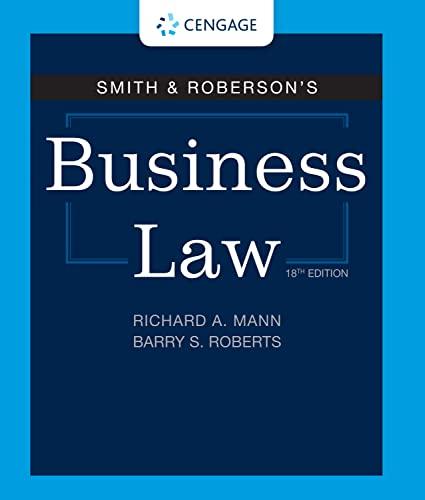Question
Adrian, a fully qualified specialized registered nurse, is deaf. He relies upon an American Sign Language (ASL) interpreter to communicate with hearing individuals in the
Adrian, a fully qualified specialized registered nurse, is deaf. He relies upon an American Sign Language (ASL) interpreter to communicate with hearing individuals in the workplace. Adrian applied for a job with Carmel Receiving and Trauma Center ("CRTC"), a large medical center that, with all its hubs and subsidiaries, grosses $1.3 billion annually. Net profits are in the millions. Adrian received a job offer, conditioned upon a health screening and clearance by CRTC's occupational health department. He was in fact cleared, but he notified CRTC that he needed an ASL interpreter as an accommodation for his hearing impairment. The annual salary, including benefits, for his position was approximately $75,000. Upon investigation, CRTC calculated that the annual cost to CRTC for the ASL interpreter accommodation would be an additional $100,000; there was the need for a full time interpreter for Adrian, plus several situations where two ASL interpreters would be required. In considering Adrian's request for accommodation, the hiring supervisor wrote in an email to her boss that the department's annual budget allocation could not absorb the "excessive cost of the additional personnel" of ASL qualified interpreters "for this one nurse." Based on the cost of the accommodation, CRTC immediately determined that the additional salary and overhead for the interpreters would be an "undue hardship," making the accommodation unreasonable. Therefore, CRTC did not hire Adrian. Did CRTC violate ADA?
1. Was CRTC within its legal rights under ADA to refuse the accommodation and thus not hire Adrian on the basis of undue hardship? In considering this case, you should review:
(a) what is considered a "reasonable" accommodation under ADA including sample accommodations listed by ADA (42 U.S.C. 12111(9) (2018)) and the EEOC (www.eeoc.gov); and
(c) the definition and standard for employer "undue hardship" (42 U.S.C. 12111(10)(a) (2018)); and
(d) case law - what do the courts consider in determining if there is undue hardship?
2. Are there ethical considerations involved in this case beyond what is required by the "letter of the law" and if so what are they?
Step by Step Solution
There are 3 Steps involved in it
Step: 1

Get Instant Access to Expert-Tailored Solutions
See step-by-step solutions with expert insights and AI powered tools for academic success
Step: 2

Step: 3

Ace Your Homework with AI
Get the answers you need in no time with our AI-driven, step-by-step assistance
Get Started


